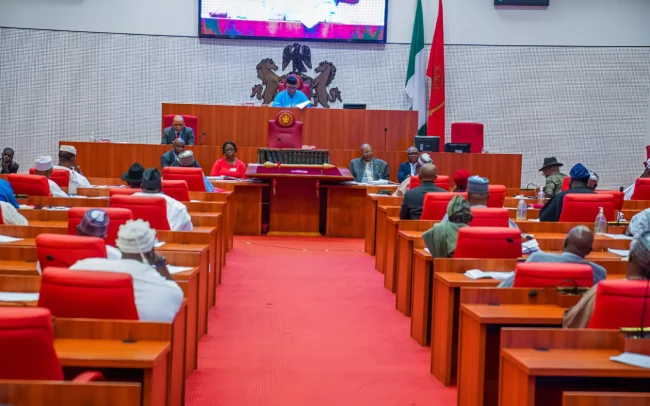
The Senate has resolved to organise a national summit to find solutions to the recurring conflicts between herders and farmers across many communities in the country.
At its sitting in Abuja on Tuesday, presided over by its President, Sen. Godswill Akpabio, the Senate resolved to set up an ad hoc committee to plan for the summit.
It came as an attempt by some northern senators to revisit the return of grazing routes for cattle that fell flat on the floor of the Red Chamber.
The Nigerian Tribune recalls that the 9th Senate (2019-2023) conducted several investigations into herders and farmers’ crises and also held a similar summit aimed at addressing such conflicts.
The 9th House of Representatives, under the leadership of Rep. Femi Gbajabiamila as Speaker, took it a step further in 2022 by organising a special national summit on insecurity.
The Gbajabiamila House made far-reaching recommendations, including measures to combat terrorism, kidnapping, banditry, herders’ conflicts, and economic recovery plans.
However, the Senate on Tuesday took the decision to hold another summit, a resolution that flowed from a motion of urgent national importance moved by Sen. Isah Jibrin.
Jibrin, the Chairman of the Senate Committee on Customs, who represents Kogi-East Senatorial District, had sought the Senate’s intervention for the “rehabilitation of Ofagojeju Odo, Ajokpachi Odo, Bagaji, and Bagana communities in the Omala Local Government Area of Kogi State,” where he alleged that attacks by herders had claimed about 500 lives.
For instance, he stated that “on April 5, 2024, armed herders invaded Agojeju Odo, Ajokpachi Odo, Bagaji, and Bagana communities, killing 21 innocent citizens, including women and children, in addition to the unprecedented destruction of their farm produce.”
He added, “Further alarmed that the attacks on these communities in Omala LGA have resulted in the killing of over 500 citizens, in addition to the wanton destruction of public and private properties worth hundreds of millions of naira.”
Several senators, while contributing to the debate, called for the needed political will to end the killings by herders, using the guise of herders and farmers’ conflicts that often resulted in whole communities being wiped out by invaders.
Sen. Victor Umeh (Anambra-Central) observed that cattle rearing, as a business venture, should be confined to a location by the owners, just like the farmers who invest so much resources in their farms and expect to make a profit during the harvest season.
“Ranching is a global practice. We can’t have a situation today where cows will be roaming around and destroying farms,” he said.
Umeh also noted that in other countries, whenever people committed crimes like murder, arson, and deliberate invading of communities, there were usually arrests made and prosecutions secured, as against the situation in Nigeria.
Former Senate President, Sen. Ahmad Lawan, and a couple of other lawmakers from the North argued that Nigeria’s herders were poor and were unable to mobilise the huge resources required to effectively manage a modern ranch without the support of the government.
Lawan wondered why the same federal government that had used public funds to rescue failed banks and spent on electricity distribution in the country in spite of its privatisation reforms could not assist herders to organise their operations.
“We gave DisCos N1.4 trillion after selling them. The government should take responsibility to resuscitate those who do no other business than cattle rearing,” he maintained.
The Chairman, Senate Committee on Judiciary, Human Rights, and Legal Matters, Sen. Mohammed Monguno (Borno State), in a move apparently backed by most of his northern colleagues, sought to amend the prayers of the motion to read that the federal government should create new grazing routes for cattle to continue to roam from up north to down south.
However, his motion fell flat, as the majority of lawmakers voted loudly against his prayer.
Former President of the Nigerian Labour Congress (NLC), Adams Oshiomhole, raised concerns that, for many years, Nigeria had been unable to cure the killings and counter-attacks involving herders and owners of ancestral lands.
He recommended an amendment to the prayers of Isah’s motion to include the holding of a summit to do a holistic review of the conflicts and find “real solutions.”
Meanwhile, Sen. Musa Garba (Kebbi South), while narrating the experiences of his people in the hands of bandits, disclosed that the Kebbi State Government paid N500 million monthly to the Nigerian Army to maintain security in the area.
“My governor gives the army N500 million,” he said, wondering why any state would have to give the army extra money in spite of the funds budgeted for the military in the 2024 budget.
His revelation came as a surprise to senators, some of whom asked whether he was sure of his disclosure.
“Are you sure of this? N500m?” Akpabio specifically asked the Senator, who replied, “This is the information from my governor. That is what my governor told me.”
ALSO READ THESE TOP STORIES FROM NIGERIAN TRIBUNE
Source: